Pakistan: A Land Where Men are Men and Women are Invisible
My real regret with buying the Enfield is the state of exhaustion and pain it would leave me in each evening. One of the victims of this was my diary. Since Nepal, the entries were few and far between, to the extent that unfortunately I gave up early in Pakistan. So the sources of this newsletter are memory (oh dear) and photos.
As we travelled through countries, I would often muse over how I would portray them in our ramblings to you. Very early on in Pakistan I knew EXACTLY how I would open up this newsletter - DON'T BELIEVE THE HYPE. Virtually every local we met expressed how worried they were about how the whole was nation being portrayed in the press - extremist, reactionary, pro-terrorist, Al-Qaeda harbouring and anti¡Vwesterner. What struck me so vividly in Pakistan was that you cannot, and should not, judge people by the politicians that supposedly 'represent' them. The everyday Pakistani that we met could not have been more happy to see us, they were respectful and polite even when WE pissed THEM off.
Our safety, as usual, was paramount, and not once did we feel threatened when owning up to being British, even though the Iraqi war had only ceased 2 months before. It was a tough decision in the first place whether we would cut short the trip by by-passing both Pakistan and Iran for 'safety' reasons, shipping the bikes out of Mumbai (Bombay) directly into Europe. Ever since Japan I had kept an eye on the British Foreign and Commonwealth Office website which gave super-cautious advice on travel all over the world. It recommended that only people on essential business or 'non-white British' people should visit Pakistan. It also warned that if we got into trouble, the British Government could give little assistance as the British Embassy in Pakistan had closed. All in all it didn't look that hopeful but we decided to approach it from a different angle; we applied for visas to see if the Pakistani authorities would think it safe to let us in. We were relieved and amused when the Pakistani official in Kathmandu, inevitably aware of most visitor's misgivings, announced "I think you will enjoy our country". And as it turned out ... he was bloody right.
Leaving India (having avoided the monsoon and various of sources of premature death) we realised that we were about to enter a country that only half a century ago was part and parcel of that near hell until Partition became reality in 1947. I reckoned this would make excellent material for a nature vs nurture study. Could the Muslim Pakistanis really be any different from their Hindu neighbours? The answer was immediate and our judgment remained the same throughout - thankfully YES.
The tension between Pakistan and India has been evident ever since the bloody Partition. Recently it has eased as the two sides resumed talks. Unlike other international land borders there is minimal cross-border trading. The import/export that does exist has spawned a strange border ritual, where colour coded porters on either side meet and handover goods across the border line, and guards on each side make sure that Indians don't sneak into Pakistan, and vice versa. So a stream of blue pyjama'd Indians shuffled single file to the border gates carrying boxes on their heads and passed them over to their Pakistani orange pyjama'd counterpart who walked away in a mirror image.
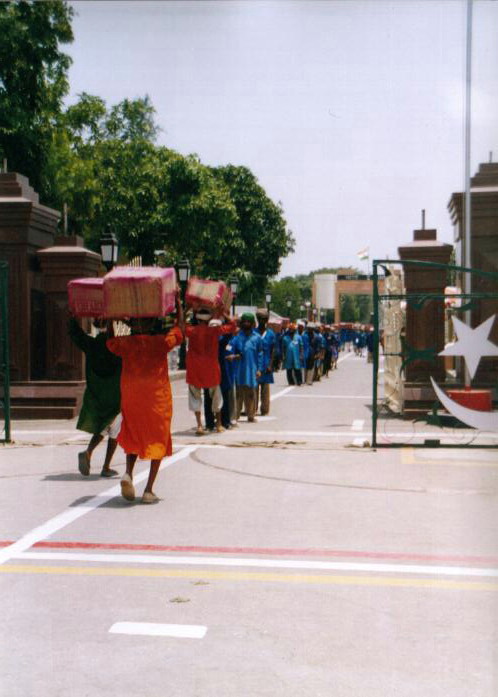
International logistics in action
I wondered how long we would have to wait at customs and if we could avoid our first bribe. Word on the street was that a sweetener was required to prevent a long drawn out inspection of our baggage. Bossman eventually turned up, apologised for the heat then asked us 20 questions about how the guarantee on the carnet worked and why when he put in claims to European Automobile Associations they were never honoured. His speech and movement were laboured, I mentally diagnosed Parkinson's disease, so I helped him fill in the customs ledger and we were sent on our way - no inspection, no bribery - a result (question to self, why does it never happen to us, are we just nice people?)
During the short ride into Lahore we were befriended and escorted by several bikers. We entered a city suffering from heinous air pollution, the filthy 2-stroke tuk-tuks being the main culprit. Several years previously Bangkok had seen the light and only permitted 4-strokes, I hoped Lahore would go the same way. The old walled City with its bazaar and fort was a highlight. We spent several days wandering around the alleyways. Pakistan was our first really Islamic state and I endeavoured to dress accordingly. The shalwar kameez (cotton baggy trousers, long tunic and scarf) that I had bought in India was an immediate success. I was flattered to receive compliments about my attire from young women.
We were equally astounded by the number of people who approached us just wanting to welcome us to their country. Children would be sent to shake our hands and requests for photographs were at an all-time high. During a Sunday evening stroll in the Shalimar Gardens we meet dozens of children vying for our attention, inviting us to meet their parents. Though ridden with hair lice and suffering from skin complaints it was hard to ignore their gorgeous green eyes that reminded me of the famous 1984 National Geographic front cover of the Afghan girl.
Surprisingly a very common opening question would be "Are you a Christian?" Muslim Pakistanis were keen to know, and many Christian Pakistanis would actively seek us out. Simon, being a devoted atheist, caused a few shocked and offended reactions and we came to realise that it was safer admitting to being a Christian than an atheist in the Muslim world, since a belief in some God is better than no God at all! So Simon had to pretend to believe in God for the rest of Pakistan and Iran. It was refreshing to meet two proud lovers, escaped from their chaperone - he was a Muslim lawyer and she a Christian school teacher. It would be interesting to be a fly on the wall when those two families met.
During our visit to the Fort I became aware of a group of young girls who were taking a great interest in me and it didn't seem anything like the zombie curiosity of the Indians. I bumped into them again and so took the opportunity to practice the general Muslim (Arabic) greeting of "Assalam alaikum" (Peace be with you). The girls were agog and seemingly asked me if I spoke Urdu. I was sorry to disappoint them. Little did I know or appreciate that the liberal city of Lahore would be last time that I would see women in this country wandering freely about and eager to interact with us. After that we would be in the countryside, and there we would only meet men - the only women we would see would be working in the fields and desperately avoiding contact with foreigners.
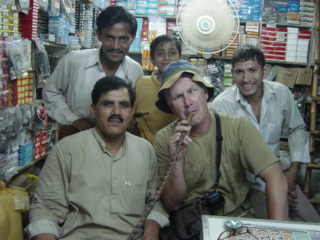
Hospitality in a bike shop
The Pakistanis are huge in comparison with their Indian relatives. Some of the men were the size of mountains - we got scared by one gentle giant (Bernard Breslaw lookalike) who couldn't understand why we weren't planning to visit his village 'in the back of beyond' - if he had really insisted we visit, we could not have fought him off. The fact that the Muslims eat meat and their Hindu counterparts are vegetarian must have something to do with it. The Pakistanis do prohibit the consumption of meat on 2 days every week, but luckily chicken is not considered meat (!!), so on those days you can still get your protein fix in the form of a fabulous chicken jalfrezi. My mouth is just watering at the thought of it.
In preparation for the imminent Iranian visit I realised I needed to buy myself another shalwar kameez outfit. Bagginess and modesty are a must in Muslim countries. T-shirts and standard trousers are out since the showing of skin or the mere intimation of the shape of a woman's body is a big no-no. I would never claim to be a shopaholic, but choosing a shalwar was great fun. There were literally thousands of backstreet boutiques selling DIY outfits in the form of pre-matched lengths of material that would combine to make the trousers, tunic and scarf. All I had to do was sit back whilst a group of boys ordered me a Coke then showed me hundreds of combinations, the choice was mind-boggling.
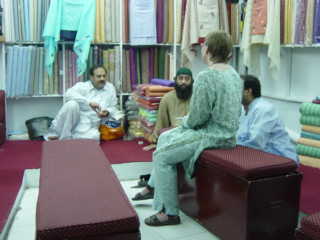
Shopping
I settled for a bright red/yellow/black tartan-like outfit; I wanted to make a statement. A tailor was summoned to measure me up, since we left the sewing machine at home, and the next day I picked my little number up. I was later mortified to read in the Lonely Planet that wearing red was in Iran is dangerous because it is associated with the enemy of Emam Hossein - Mohammed's nephew. Would I get lynched wearing the new outfit?
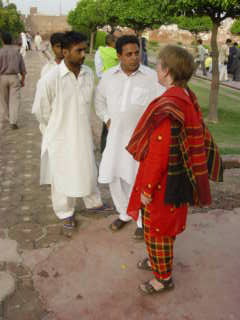
A little red number
Not to be outdone, Simon bought the typical male kurta pajama. He wasn't convinced by the shop keeper's assurance that he didn't need to try it on because "the size is perfect". However, the trousers turned out to have a waist of 245cm (96 inches) so he could get the bike in the trousers too. Hours of fun were had playing at being MC Hammer, and our fancy dress outfits are organised for the next 10 years.
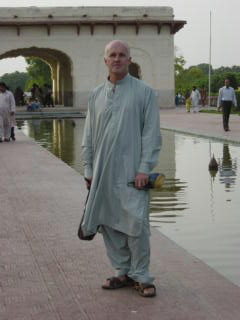
STOP! Hammer time
"I'm 75 you know" perked up an elderly Pakistani gentlemen in the market "and British. I was born during the Empire, so therefore I'm British. By the way, Churchill was a great man". It's funny how our war-time politician has been so highly praised throughout our journey. And as for him wanting to be British, I did find that strange.
We tried to learn a little about colonial India and its subsequent partition in 1947. There was great bloodshed in the country as Muslims fled to the north west and north east corners of the region where Western and Eastern Pakistan (now independent Bangladesh) were created. I'm not quite sure how they ever thought the two geographical parts of the country could be ever be governed as one with India separating them.
Most people know of Gandhi, the Hindu figurehead during the Partition. Less well known is the Muslim leader at the same time. Ali Jinnah who remains Pakistan's number one hero. After the release of the multi-Oscar winning epic film Gandhi, Pakistan was unhappy with the portrayal of Jinnah, and in fact the film is still banned. To redress the balance, a film of Jinnah's life was released in 1998, but the project was plagued by controversy. Christopher Lee was cast as the lead causing arguments about whether a horror film star was the right sort of person to portray the national hero. Then rumours were spread that Salman Rushdie was to write the screenplay and finally the critics were incensed that a Hindu was cast to play the Archangel Gabriel (although no one seemed to mind that an Archangel turned up in 1940s Indian politics). As coincidence has it, I watched Christopher Lee being interviewed on Breakfast television only this week, to hear him claim that his acting role in Jinnah was the most challenging of his 50 year film career ¡V the DVD comes out soon.
Time to leave open-minded Lahore and marvel at the contrasts of modern structured Islamabad (the capital) and its sprawling chaotic neighbour of Rawalpindi. We hoped to enjoy safe passage on the new motorway, and we ignored the signs banning motorcycles and were encouraged by the gun clad policeman waving us onwards. Bliss, three empty lanes of asphalt all to ourselves - until we reached the toll booths where a female police official unceremoniously broke the spell. We pleaded with her in the stifling heat to allow us to use the motorway where we would be much safer away from the lawlessness on the Grand Trunk route. This she took completely the wrong way thinking we were accusing the Traffic Police of being on the take. "Sir, we are the only department who are 100% incorruptible". I suppose this didn't bode well for the rest of the country. Without the special dispensation to use the motorway ("you can go into Lahore and ask the Head of Police") we were forced to rejoin the mayhem on the Grand Trunk route.
Pakistan was another country with a distinct lack of road signs even on the main road to the capital. Stopping to ask policemen was a double edged sword; they were helpful and knowledgeable ("the road you need is behind you"), but keen to show off their power ("Sir, if you turn to go in that direction I have the power to fine you as you make that illegal turn"). When Simon remonstrated that we didn't have a reverse gear, the policeman donned his white gloves, stopped the traffic and allowed us to break a few rules.
Further on down the road we were pulled over yet again by an inquisitive doughnut brigade. "What now?" we thought. "We'd like to invite you to take a Pepsi with us". This was a case of wrong place, wrong time, it's not you, it's me. We had already lost so much time faffing around at the motorway we couldn't afford any more passing the time of day with strangers. We plugged on only to suffer another attack of hospitality at a petrol station where we stopped for a wet-down. I suppose my hanging out in the tiny patch of shade outside the gents toilet wasn't good PR. The manager lured us into his air-conned office with yet another drink and told us he'd seen us being turned away at the motorway toll booths. We all reminisced over curry houses in Rusholme since he regularly visited Manchester where his girlfriend lived. Small world!
Foreign bike alert at the next checkpoint. German number plate, XR250, lo and behold it was Ulli who we'd met seven weeks ago outside the Pakistani embassy in Kathmandu. The policemen presented us with a 'homemade orange drink' which we couldn't refuse, though dearly wanted to, then suspiciously questioned us on how we knew each other. The three of us agreed to ride into Rawalpindi together, but the presence of a slow moving police car in front of us seemed to suggest we were being given an unwanted escort. We kept our cool and waited for them to get bored. They eventually allowed us to overtake them, but in no time at all I looked in my mirror to see that they had mysteriously pulled Ulli over. When he was eventually allowed on his way, he explained that as motorcyclists we were being reprimanded for not driving to the left of the yellow line which was basically a gutter area full of debris and highly dangerous holes. Our monster bikes were supposed to follow the same rules applying to putt-putt mopeds. We appeased the jobs-worth officer until he was out of sight and out of mind, then we reverrted back to the main carriageway.
Our only reason for going to Islamabad was to obtain our Iranian visa. This was the last piece in the jigsaw puzzle for our big trip and traveling through Iran would complete the full circle back to Turkey. Our stress levels were kept to a minimum by making use of an internet visa agency in Iran. For a reasonable charge of 30 USD each, the agency made the initial application on our behalf for the visa directly to Tehran. This meant that picking up the visa in Islamabad was a doddle and avoided us having to hang around the Iranian embassy for days on end, like several frustrated tourists we met. So here I shall shamelessly plug the Pars Tourist Agency at www.key2persia.com.
Visas in hand we waved good-bye to Ulli who had been our dinner companion for a week and wished him well for his adventure into Afghanistan on his bike. And yes of course we had been curious about such a detour ourselves but never really tempted to stray, because of the dangers involved. A week before arriving in Islamabad, an Italian motorcyclist had been killed near Kandahar in Afganistan. Fortunately Ulli managed to survive his transit through the country.
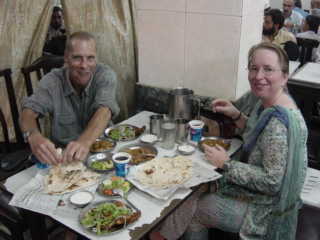
Ulli joins us for a Pakistani dinner party
We were now to embark upon one of our major goals - ride the Karakoram Highway, aka the KKH. The KKH is a 1,300km road jointly built by the Pakistani and Chinese armies during the 1960s and 70s. It connects the Silk Road market of Kashgar in China with Rawalpindi. Its highest point is the Khunjerab Pass at 4,730m which acts as the border between the two countries and this would be our terminus since getting the paperwork for visiting China on motorbikes was beyond our budget and timescale.
We were pleasantly surprised at how quickly the metropolis of Rawalpindi disappeared and turned into rolling countryside. We followed the banks of an innocuous river most of the day until bang, we hit what we were waiting for, the 'Mighty' Indus. We could immediately see why the river was dubbed that name. Its force was indomitable and not once during the seven days that we were its companion did we see any vessels or fishermen trying to tame it.
The second day's ride took us to Chilas, a town that invariably we were warned to avoid. Not only was it claimed that the locals would be hostile towards foreign women, but the town was in the heart of a region known as Yagistan - Land of the Ungovernable. Even the British left this area well alone during the colonial period. To be fair though, the waves from men and children along the roadside (the women had all but disappeared) were no less forthcoming than anywhere else. The only oddity was at the frequent checkpoints along the KKH. Most posts were interested to know when you entered Pakistan and what your visa number was. Around Chilas all they wanted to know was when you entered their region and when you would be leaving it.
Every hour we rode the scenery became more and more spectacular. You could never describe it as pretty but just incredibly raw. The area is a collision zone of the Indian and Asian continents and the mountains are still being heaved up. There was very little traffic on the road so every time we stopped for a rest and water the sounds of nature were eerie. Apart from the roar of the river, Simon swore that the rustling of shale falling down the slopes was preceded by a groan and rumble as plates collided and imperceptibly changed the landscape forever. This was geology in motion, with the Indus carving a steep sided valley with fantastic but unstable rock walls that must have daunted the KKH engineers and navvies alike. As we moved further north, snow-capped mountains began peering over our shoulders and glaciers almost crossed the road. I wish I could adequately describe to you the colours, every imaginable shade of mauve, terracotta, brown and grey gave the impression the landscape could only be extraterrestrial.
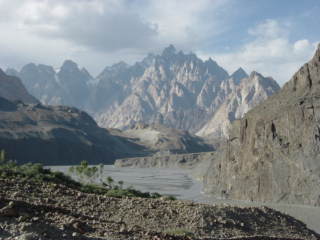
Raw Geology - The KKH
Halfway up the KKH we were frantically waved down by an oncoming 4x4. "Are you Simmonds?" Spooky! The female passenger was Shadmeena, a female mountain guide, British Council worker and friend of our Belgian biking friends, Iris and Trui. We had hoped to bump into Shadmeena further up the KKH in Gilgit but when we'd emailed her she had explained that she would be flying back to Lahore. Amazingly her flight had been canceled so had to go by car. We were amazed to bump into her, but logically as there is only one road, the chances are pretty high. We were glad to cross paths even if so briefly. Unfortunately our plan to meet her British housemate in Gilgit was blown since she was en route on horseback to the region's most famous annual sporting event - a polo match between Chitral and Gilgit on the world's highest polo ground in the remote Shandur Pass. The BBC and Michael Palin were reported to be there this year so locals were hoping it might be televised live. Polo, believe it or not, has more supporters than cricket in the north of the country.
Gilgit was the main tourist town just off the KKH. Our guesthouse was a haven of tranquillity and travelers from all round the world seemed to congregate there with stories of derring-do. It was obvious through conversations how 9/11 has effected the tourist industry in this struggling region. Even though money must have been tighter than usual we received an unexpected invitation to eat at Yaqoob the manager's home one evening. He laid on a sumptuous feast for at least 7 of us tourists and never asked for a contribution. That act really summed up the innate nature of hospitality of the Pakistanis. Getting to know Yaqoob we inquisitively asked him who was the old fellow that hung around the guesthouse. He seemed to be permanently seated at the dining table with staff bringing out tea and food. Yaqoob wasn't sure exactly and explained his reaction by telling us a similar famous anecdote of an unknown man who for years regularly visited a home to receive refreshments until someone asked the head of the household who he was, "I've no idea", he replied, "He was a guest of my father".
Although open all year round, the KKH suffers from innumerable landslides that temporarily block the road. We were only held up by one such incident but came across several stretches of sand and rubble that indicated recent rumblings. The majority of traffic using the route was buses and brightly painted lorries that transported goods to and from the Chinese border.
The last Pakistani town on the KKH was Sost, a dire trading post full of anxious businessmen waiting for signs of their lorries crossing the border. Some were hanging around for days hoping that their specially permitted consignment of pork products for the Chinese communities in Pakistan would still be edible. It was here at 3,000m altitude that I had the most vicious of headaches that almost prevented me from reaching our goal of seeing China - the country we had skirted around ever since Kyrgyzstan over a year ago. Bunged up with painkillers and a couple more hours sleep we set off on our own bikes for the border. It was a steady climb to the 4,730m Khunjerab Pass and mercifully my headache dulled. The temperature dropped to a chilly (for us) 17C, the golden marmots were in playful mood and the one-man band border patrol security guard thankfully accepted our 'Manchester United pencil bribe' to allow us into no-man's land and as close as possible to the Chinese border to take our photos. With a tear in both our eyes we realised that we really were going home now. And not too soon, I had to say.
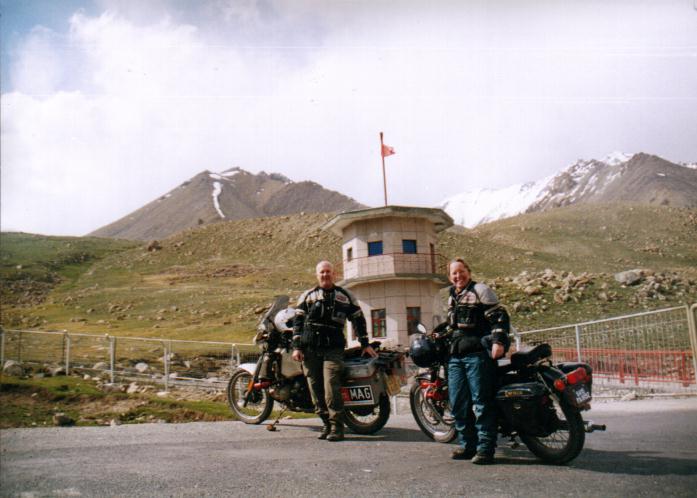
Can we go home now!?
We retraced our steps for three days then over the Shangla Pass into the 'beautiful' Swat Valley. How many times have we been duped by locals effusing over a particular area? For us the Swat Valley was a flat boring plain that grew onions and tobacco, but for the locals it was as fertile as it gets, so a place to be revered. Stark, barren, rocky landscapes were more our cup of tea, not the Vale of Evesham.
Only 277km by road from Kabul was Peshawar, a city dominated by the feisty Pashtuns, the world's largest autonomous tribal society. Historically they have been ferocious fighters and are obstinately proud of their heritage. Being so close to the border at the infamous Khyber Pass, Peshawar is home to many Afghan refugees. I thought this might be an ideal place to buy a hejab, a simple headscarf (like a baggy hood) to be worn in Iran. The design meant that I wouldn't have to awkwardly pin the scarf each time to cover my hair. We visited a couple of shops in the Women's Bazaar but no-one quite understood what was needed, the best attempt was a nasty black nylon scarf that made me look like a nun. We explained again to a shopkeeper whose face lit up. "Ah, madam, I think you are asking for a shuttlecock burqa, you just place it over your head, yes?" He sent his boy out to get one. My expression dropped when I was presented with a full-length burqa complete with embroidered face grill. I had been dying to try on one of these gross injustices to womankind. The 3-man tent was lowered over my head and I almost died. The sheer mass of material hung heavy and the restrictiveness around my face was stifling. With my vision through the grill impaired this was no longer a 'laugh' for me. No woman in her right mind should have to put up with the indignity of the burqa.
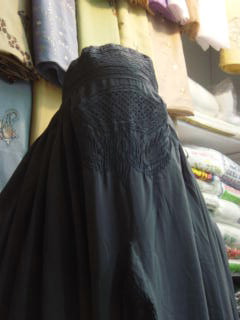
Georgie oppressed
Up to date road maps in Pakistan were hard to come by and the political situation changes daily. So we sought advice from the tourist board in Peshawar as to what route we should take to the Iranian border. I was pleasantly surprised to see a woman working in the office so plucked up the courage to ask her where the rest of the female population was. Ever since leaving Lahore we had seen but a handful. Even in the markets it was only men doing the shopping. The women, she explained, were at home. They can come out if they want to, but they don't want to. I doubted this apparent freedom to chose. I remarked that that surely they missed the ability to socialize in cafes as we had seen so many men do or just sit outside along the country roads and watch the world go by. And then she came out with the lamest excuse ever, basically ignorance is bliss and what the eye doesn't see the heart doesn't grieve over. "If a woman only has daughters she doesn't miss not having sons because she doesn't know what it's like to have boys in the first place." What pained me was that this woman was obviously well educated but her attitude was 'I'm alright Jack'.
We got the information we were looking for and were able to plan our route. We chose to by-pass Darra, a small, wild-west town whose inhabitants do only one thing - make or sell guns. For around $150 we would have been able to buy our own AK-47 and test driven it. We couldn't avoid the garrison town of Kohat having been prevented from entering a newly constructed tunnel by gun-totting security guys. Yet again the use of a modern road in Pakistan was deemed unsafe for a motorcycle. So instead we were re-routed over the mountain on the old road and found ourselves in a town full of military installations. The traffic police were shocked to see foreigners in the town and in no uncertain terms showed us the way out - no hint of a Pepsi from them.
The following 48 hours were to prove a test of resolve, resilience and nerve. I can't actually believe what we got away with. We could easily have spent a few nights in jail, but instead we came up smelling of roses. And we started to discover how Pakistan manages to spend 70% of its national budget on security...
... It all started when we checked in to our hotel in DI Khan. As usual I had to fill in the registration book and include our destination for the next day - DG Khan (NB neither of these towns have anything to do with The Sweeney or the BBC). I was surprised to be asked exactly what time we would be leaving but I gave an estimate nonetheless. After a restless night listening to the emergency generator turning on and off, yet more power cuts, we opened our door to be greeted by a soldier with a rifle (actually an Enfield rifle!) who seemed to be guarding the hotel. We thought little of it until he marched into our room asking us again what our departure time was. We politely requested that he leave. It seems that an open door in Pakistan is an open invitation for ANYONE to enter.
Riding at our genteel pace out of DI Khan we became aware that the police pick-up truck in front of us was keeping at the same speed. As a test we pulled over under some shade and watched the vehicle stop and turn around. "Is everything OK, sir?" they asked. We asked why they were escorting us. "Ah, it is for your own protection sir". Simon didn't want their 'protection' so asked them to leave us alone. They seemed a little uncertain but agreed to give up. No sooner had we regained our freedom than another vehicle was on our tail. We spent the rest of the day playing cat and mouse with the marked and unmarked trucks getting more and more frustrated and angry with them as they picked up our trail along their section of the main road. One option of course would have been to accept their escort, but since none of them could explain why we needed protection it became a matter of principal. So far we had felt extremely safe in Pakistan so why would things change now?
Tensions grew when we furiously waved down yet another vehicle. A couple of burly man-mountains in standard kurta pajama garb stepped out. We requested to see their ID. "We don't have any ID on us. But we are policemen because we have POLICE painted on our truck". We said we didn't believe them and that they could easily be Al Qaeda terrorists targeting us! At the next kosher police checkpoint we pulled over and made a complaint about the people following us. "But sir they are policemen, can't you see it's written on their bonnet?" Cue for Simon to get out his permanent marker pen and write POLICE on his white plastic hand guard. "Now I'm a policeman, so bugger off".
We were relieved to realise that we were reaching our destination of DG Khan. On the outskirts a huge checkpoint was assembled, the policemen excitedly waved us onto the by-pass. In the lead, I put on my Steve McQueen expression, boldly ignored all attempts to stop us and rode through into town. "Somebody stop me!" And they did just that by a small market place selling fly infested animal feed. Had we pushed it just that little bit too far? We demanded to see the Head of Police in DG Khan when they ordered us out of town immediately. He duly came along and then courteously invited us along to his station. I wondered how this would compare with our Turkish and Krygyz encounters. We entered a small compound to be greeted either side by rather overcrowded prison cells, their occupants peering out to see us through the grills. We sat down in the Chief Donut Eater's office. He offered his apologies for his men not wearing uniform but since it was a Sunday they were allowed to dress casually, this was also meant to explain their lack of ID. A plate of mangoes appeared which we messily ate along with the obligatory 7-Up. He produced a year-old police edict stating that foreigners were not allowed to enter DG Khan, so we would have to accept an escort to the next town of Fort Munro. We reluctantly agreed and rushed to set off before it got too late.
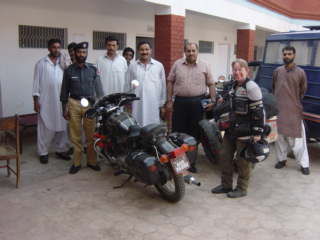
Doughnut brigade on their dress-down day
Twenty or so kilometres out of town the pick-up truck slowed down to let us past. This was clearly the end of their jurisdiction so we were left to our own devices again. It wasn't long though before we got stopped once more and told we needed to wait for another escort, but not before the bossman ordered up a huge water melon in our honour and ordered us off the bikes. "For God's sake will someone give the hospitality a rest, we just want to find a hotel". This time the policeman guided us all the way on his brand spanking new 'Honda 90cc Cash Deposit' ('Cash Deposit' really is the model name, painted across the tank), complete with protective bubble wrap still over the mirrors. How tempted was I to rip that off at the end? He guided us through the scariest and narrowest of single tracks which clung onto a cliff face.
Eventually arriving in Fort Munro we were taken straight to the police station for more registration. This must have been the most exciting thing that had happened for ages. The office was full of onlookers, well the door was open wasn't it. The officer had no absolutely no idea what information he required and where he might find it in our passports. Two 13 year old boys acted as interpreters. I thanked them and commented on their perfect English. "Well, we're from Lahore you know. They practically can't read or write up here". They later told Simon which school they went to. It meant nothing to me but Simon impressed them by recognising it as the same one that Imran Khan attended.
Having booked our obligatory escort for the following morning we eventually settled into an overpriced hotel, full of partying Pakistanis, including the Chairman of the English Department at Lahore University who guess what, wanted to offer us mangoes and whisky. We did learn here though why DG Khan was being less than friendly to foreigners - it was the home to the Pakistani nuclear industry!
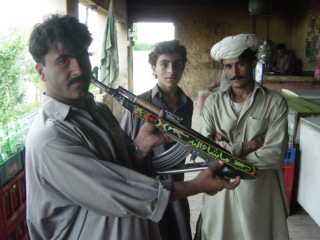
The strap says 'Mashallah' - God has willed it
We say "whatever you say mate"
Our last moped escort took the opportunity to give his mate, with all his shopping, a lift down off the Fort. We thought we drove slowly but this was painful so we overtook and sped off into 'The Tribal Areas'. This was a pretty much lawless area of Pakistan that the government kept well out of. Granted, every adult male toutted a Kalashnikov as his accessory of choice, sported a healthy long black beard and a huge turban-like head dress. You felt like you shouldn't mess with these guys, but place a camera in front of them and their faces lit up with a broad smile and shining eyes.
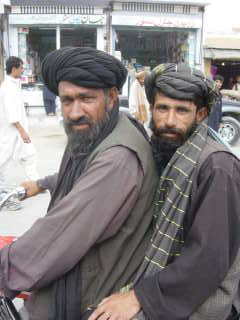
Pashtun bikers
The roads were barely roads in the region. Stony and sandy tracks zigzagged across a ripped up road that was being rebuilt. We had incredible luck passing through the area during days without rain. An Italian father and son team travelling in a Land Rover a couple of days later had experienced several flash floods that prevented them from crossing river beds for many hours. I dreamed of owning an F-650 as my suspensionless Enfield hit rock after rock after rock. It only stalled once before a real river crossing and took a long time to restart. In the distance we could both hear gunfire.
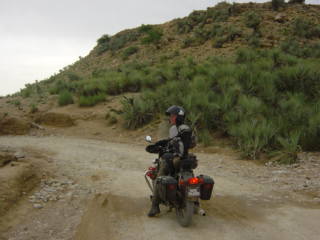
I wish I had some suspension
We had been storing a couple of dozen pencils in our tank bag for 'deserving kids'. We tended to ignore the kids that shouted the mantra "Money, pen, sweet" with a held out hand. Fearing that we might end up going home with the blasted pencils I jumped at the chance of off-loading them at a school we rode past. The open-air classroom was a mixture of ages and surprisingly both boys and girls. The kids were dumbstruck as they saw us and found it difficult posing for a picture. As we rode away with a bag of mangy peaches I suddenly realized that all teaching was being done on slates with chalk. Oh well, they seemed grateful.
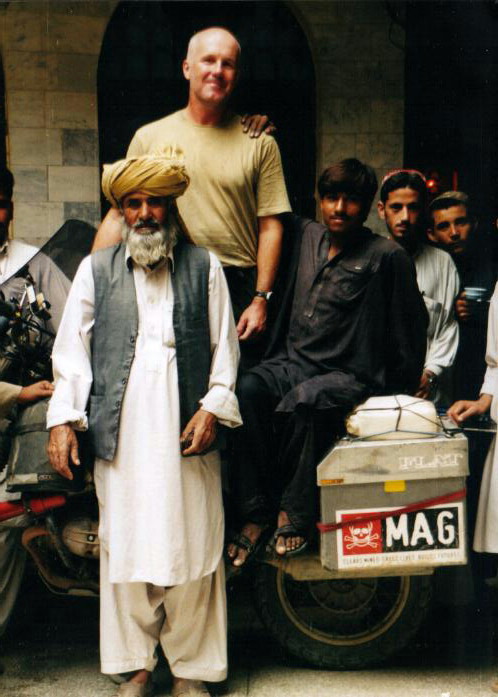
Local lads
Quetta was the last major city to visit, and a pleasantly organised and clean one at that. A service for both bikes in the forecourt of the hotel before 2 days in the desert of Baluchistan and onwards to Iran. Our last night (not of sleep though) in Pakistan was in Dalbandin. When we checked in at least we were warned that there would only be no electricity between 8pm and 2am. As we sadly listened to our fan wind down in the early hours our thermometers read 38C (100F)...
I wondered what temperature it would be in Iran ...
FINAL NOTE: For all those pub quizzers out there, how did Pakistan get its name? No, it's not because it means 'Land of the Pakis' but is in fact an acronym referring to Punjab, Afghania, Kashmir, Sind with the suffix STAN meaning 'country' in Persian. How many pop pickers knew that then?
-----------------------------
Number of weeks = 4.5
Miles in country = 2,170
Kilometres in country = 3,472
Total miles so far = 27,877
Total kilometres so far = 44,603
